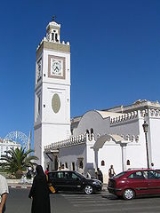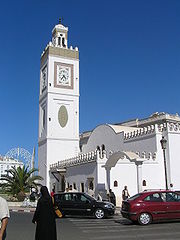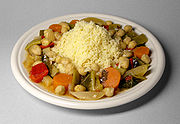
Culture of Algeria
Encyclopedia
The culture of Algeria
encompasses the development of literature, music, religion and cuisine.
and Azrag Omar in the late eighties. Famous novelists of the twentieth century include Mohammed Dib
, Albert Camus
, Kateb Yacine
, Ahlam Mosteghanemi
, while Assia Djebar
is widely translated. Among the important novelists of the 1980s were Rachid Mimouni
, later vice-president of Amnesty International, and Tahar Djaout
, murdered by an Islamist group in 1993 for his secularist views.
In philosophy and the humanities, Jacques Derrida
, the father of deconstruction
, was born in El Biar
in Algiers
; Malek Bennabi
and Frantz Fanon
are noted for their thoughts on decolonization
; Augustine of Hippo
was born in Tagaste (modern-day Souk Ahras
); and Ibn Khaldun
, though born in Tunis
, wrote the Muqaddima while staying in Algeria.
Algerian culture has been strongly influenced by Islam
, the main religion. The works of the Sanusi family in pre-colonial times, and of Emir Abdelkader and Sheikh Ben Badis in colonial times, are widely noted. The Latin author Apuleius
was born in Madaurus
(Mdaourouch), in what later became Algeria.
genre best known abroad is raï
, a pop-flavored, opinionated take on folk music, featuring international stars such as Khaled
and Cheb Mami
. In Algeria itself, raï
remains the most popular,but the older generation still prefer shaabi, as performed by for instance Dahmane El Harrachi
. while the tuneful melodies of Kabyle
music, exemplified by Idir
, Ait Menguellet, or Lounès Matoub
, have a wide audience. For more classical tastes, Andalusi music
, brought from Al-Andalus
by Morisco
refugees, is preserved in many older coastal towns. For a more modern style, the English born and of Algerian descent, Potent C is gradually becoming a success for younger generations. Encompassing a mixture of folk, raï, and British hip hop it is a highly collective and universal genre.
Although is welcomed and praised as a glowing cultural emblem for Algeria, there was time when raï’s come across critical cultural and political conflictions with Islamic and government policies and practices, post-independency. Thus the distribution and expression of raï music became very difficult. However, “then the government abruptly reversed its position in mid-1985. In part this was due to the lobbying of a former liberation army officer turned pop music impresario, Colonel Snoussi, who hoped to profit from raï if it could be mainstreamed.” In addition, given both nations’ relations, Algerian government was pleased with the music’s growing popularity in France. Although the music is more widely accepted on the political level, it still faces severe conflictions with the populace of Islamic faith in Algeria.
and M'hamed Issiakhem
have been notable in recent years.
 Algeria is a Muslim country, with Christian and Jewish minorities.
Algeria is a Muslim country, with Christian and Jewish minorities.
 Algerian cuisine features cooking styles and dishes derived from traditional Arab, Amazigh, Turkish, and French cuisines. Additional influences of Jewish
Algerian cuisine features cooking styles and dishes derived from traditional Arab, Amazigh, Turkish, and French cuisines. Additional influences of Jewish
, Spanish
, Berber
and Italian
cuisines are also found. The cuisine is flavorful, often featuring a blend of traditional Mediterranean spices and chili peppers. Couscous is a staple of the diet, often served with stews and other fare.
Algeria
Algeria , officially the People's Democratic Republic of Algeria , also formally referred to as the Democratic and Popular Republic of Algeria, is a country in the Maghreb region of Northwest Africa with Algiers as its capital.In terms of land area, it is the largest country in Africa and the Arab...
encompasses the development of literature, music, religion and cuisine.
Literature
Modern Algerian literature, split between Arabic and French,and has been strongly influenced by the country's recent history. Known poets in modern Algeria are Mufdi Zakaria, Mohammed al Aid in middle of the twentieth century, and Achour FenniAchour Fenni
Achour Fenni poet, translator and academician from Algeria having participated in several scientific, cultural and literary meetings in Algeria, North Africa, Europe, North America and South America.-Collections of poems in Arabic :...
and Azrag Omar in the late eighties. Famous novelists of the twentieth century include Mohammed Dib
Mohammed Dib
Mohammed Dib was an Algerian author. He wrote over 30 novels, as well as numerous short stories, poems, and children's literature in the French language. He is probably Algeria's most prolific and well-known writer...
, Albert Camus
Albert Camus
Albert Camus was a French author, journalist, and key philosopher of the 20th century. In 1949, Camus founded the Group for International Liaisons within the Revolutionary Union Movement, which was opposed to some tendencies of the Surrealist movement of André Breton.Camus was awarded the 1957...
, Kateb Yacine
Kateb Yacine
Kateb Yacine was an Algerian writer notable for his novels and plays, both in French and Algerian Arabic dialect, and his advocacy of the Algerian Berber cause.-Biography:...
, Ahlam Mosteghanemi
Ahlam Mosteghanemi
Ahlam Mosteghanemi is a notable Algerian writer born in Tunis, the daughter of revolutionary leader Mohammed Chérif. She is the first female Algerian author of Arabic-language works to be translated into English . Thus far, the first two of a trilogy have been translated...
, while Assia Djebar
Assia Djebar
Assia Djebar is the pen-name of Fatima-Zohra Imalayen , an Algerian novelist, translator and filmmaker. Most of her works deal with obstacles faced by women, and she is noted for her feminist stance. Djebar is considered to be one of North Africa's pre-eminent and most influential writers...
is widely translated. Among the important novelists of the 1980s were Rachid Mimouni
Rachid Mimouni
Rachid Mimouni was an Algerian writer, teacher and human rights activist....
, later vice-president of Amnesty International, and Tahar Djaout
Tahar Djaout
Tahar Djaout was an Algerian journalist, poet, and fiction writer. He was assassinated by the Armed Islamic Group because of his support of secularism and opposition to what he considered fanaticism. He was attacked on May 26, 1993, as he was leaving his home in Bainem, Algeria. He died on June 2,...
, murdered by an Islamist group in 1993 for his secularist views.
In philosophy and the humanities, Jacques Derrida
Jacques Derrida
Jacques Derrida was a French philosopher, born in French Algeria. He developed the critical theory known as deconstruction and his work has been labeled as post-structuralism and associated with postmodern philosophy...
, the father of deconstruction
Deconstruction
Deconstruction is a term introduced by French philosopher Jacques Derrida in his 1967 book Of Grammatology. Although he carefully avoided defining the term directly, he sought to apply Martin Heidegger's concept of Destruktion or Abbau, to textual reading...
, was born in El Biar
El Biar
El Biar is a suburb of Algiers, Algeria. It is located in the administrative constituency of Bouzaréah in the Algiers Province. As of the 1998 census, it has a population of 52,582 inhabitants...
in Algiers
Algiers
' is the capital and largest city of Algeria. According to the 1998 census, the population of the city proper was 1,519,570 and that of the urban agglomeration was 2,135,630. In 2009, the population was about 3,500,000...
; Malek Bennabi
Malek Bennabi
Malek Bennabi is a great Algerian thinker . He wrote about human society, particularly Muslim society with a focus on the reasons behind the fall of muslim society....
and Frantz Fanon
Frantz Fanon
Frantz Fanon was a Martiniquo-Algerian psychiatrist, philosopher, revolutionary and writer whose work is influential in the fields of post-colonial studies, critical theory and Marxism...
are noted for their thoughts on decolonization
Decolonization
Decolonization refers to the undoing of colonialism, the unequal relation of polities whereby one people or nation establishes and maintains dependent Territory over another...
; Augustine of Hippo
Augustine of Hippo
Augustine of Hippo , also known as Augustine, St. Augustine, St. Austin, St. Augoustinos, Blessed Augustine, or St. Augustine the Blessed, was Bishop of Hippo Regius . He was a Latin-speaking philosopher and theologian who lived in the Roman Africa Province...
was born in Tagaste (modern-day Souk Ahras
Souk Ahras
Souk Ahras is a province in Algeria, named after its capital, Souk Ahras. It stands on the border between Algeria and Tunisia.- Geography :Souk Ahras is situated in the extreme north east of Algeria, it is 4360 km²....
); and Ibn Khaldun
Ibn Khaldun
Ibn Khaldūn or Ibn Khaldoun was an Arab Tunisian historiographer and historian who is often viewed as one of the forerunners of modern historiography, sociology and economics...
, though born in Tunis
Tunis
Tunis is the capital of both the Tunisian Republic and the Tunis Governorate. It is Tunisia's largest city, with a population of 728,453 as of 2004; the greater metropolitan area holds some 2,412,500 inhabitants....
, wrote the Muqaddima while staying in Algeria.
Algerian culture has been strongly influenced by Islam
Islam in Algeria
Islam, the religion of almost all of the Algerian people, pervades most aspects of life. The vast majority of citizens are Sunni Muslims. Islam provides the society with its central social and cultural identity and gives most individuals their basic ethical and attitudinal orientation. Orthodox...
, the main religion. The works of the Sanusi family in pre-colonial times, and of Emir Abdelkader and Sheikh Ben Badis in colonial times, are widely noted. The Latin author Apuleius
Apuleius
Apuleius was a Latin prose writer. He was a Berber, from Madaurus . He studied Platonist philosophy in Athens; travelled to Italy, Asia Minor and Egypt; and was an initiate in several cults or mysteries. The most famous incident in his life was when he was accused of using magic to gain the...
was born in Madaurus
Madaurus
M'Daourouch is a municipality in Souk Ahras Province, Algeria, occupying the site of the former Roman town of Madauras, Madaure, or Madaura which is now a Roman Catholic titular see in the former Roman province of Numidia....
(Mdaourouch), in what later became Algeria.
Music
The Algerian musicalMusic of Algeria
Algerian music is virtually synonymous with raï among foreigners; the musical genre has achieved great popularity in France, Spain and other parts of Europe. For several centuries, Algerian music was dominated by styles inherited from Al-Andalus, eventually forming a unique North African twist on...
genre best known abroad is raï
Raï
Raï is a form of folk music that originated in Oran, Algeria from Bedouin shepherds, mixed with Spanish, French, African and Arabic musical forms, which dates back to the 1930s....
, a pop-flavored, opinionated take on folk music, featuring international stars such as Khaled
Khaled (musician)
Khaled Hadj Ibrahim , better known as Khaled, is a raï singer-songwriter and multi-instrumentalist born in Sidi El Houari in Oran Province of Algeria...
and Cheb Mami
Cheb Mami
Ahmed Khelifati Mohamed better known by his stage name Cheb Mami , is an Algerian-born raï singer...
. In Algeria itself, raï
Raï
Raï is a form of folk music that originated in Oran, Algeria from Bedouin shepherds, mixed with Spanish, French, African and Arabic musical forms, which dates back to the 1930s....
remains the most popular,but the older generation still prefer shaabi, as performed by for instance Dahmane El Harrachi
Dahmane El Harrachi
Dahmane El Harrachi , , was an Algerian Chaâbi singer of Chaoui Berber origin. He is mostly remembered for his song "Ya Rayah" which has since been made famous again by Rachid Taha....
. while the tuneful melodies of Kabyle
Kabyle people
The Kabyle people are the largest homogeneous Algerian ethno-cultural and linguistical community and the largest nation in North Africa to be considered exclusively Berber. Their traditional homeland is Kabylie in the north of Algeria, one hundred miles east of Algiers...
music, exemplified by Idir
Idir
Hamid Cheriet better known by his stage name Idir is an Algerian musician of Berber origin.- Biography :...
, Ait Menguellet, or Lounès Matoub
Lounès Matoub
Lounès Matoub was a famous Berber Kabyle singer and mondol player who was a prominent advocate of the Berber cause and secularism in Algeria throughout his life.He is revered as a hero and martyr in Kabylie and the Berber World but reviled by most of the Arab...
, have a wide audience. For more classical tastes, Andalusi music
Andalusian classical music
Andalusian classical music is a style of Moorish music found across North Africa in Morocco, Algeria and Tunisia. It originates out of the music of Al-Andalus between the 9th and 15th centuries....
, brought from Al-Andalus
Al-Andalus
Al-Andalus was the Arabic name given to a nation and territorial region also commonly referred to as Moorish Iberia. The name describes parts of the Iberian Peninsula and Septimania governed by Muslims , at various times in the period between 711 and 1492, although the territorial boundaries...
by Morisco
Morisco
Moriscos or Mouriscos , meaning "Moorish", were the converted Christian inhabitants of Spain and Portugal of Muslim heritage. Over time the term was used in a pejorative sense applied to those nominal Catholics who were suspected of secretly practicing Islam.-Demographics:By the beginning of the...
refugees, is preserved in many older coastal towns. For a more modern style, the English born and of Algerian descent, Potent C is gradually becoming a success for younger generations. Encompassing a mixture of folk, raï, and British hip hop it is a highly collective and universal genre.
Although is welcomed and praised as a glowing cultural emblem for Algeria, there was time when raï’s come across critical cultural and political conflictions with Islamic and government policies and practices, post-independency. Thus the distribution and expression of raï music became very difficult. However, “then the government abruptly reversed its position in mid-1985. In part this was due to the lobbying of a former liberation army officer turned pop music impresario, Colonel Snoussi, who hoped to profit from raï if it could be mainstreamed.” In addition, given both nations’ relations, Algerian government was pleased with the music’s growing popularity in France. Although the music is more widely accepted on the political level, it still faces severe conflictions with the populace of Islamic faith in Algeria.
Visual arts
In painting, Mohammed KhaddaMohammed Khadda
Mohammed Khadda was an Algerian painter and sculptor who is considered to be among the founders of contemporary Algerian painting. He debuted in 1960. His influences included Cubism and Arabic calligraphy. He tended toward the non-figurative or abstract...
and M'hamed Issiakhem
M'hamed Issiakhem
M'hamed Issiakhem is one of the founders of the modern Algerian painting.- Biography:M'hamed Issiakhem born on in Tizi Ouzou . Since 1931 his family moved out to Relizane where he spent most of his childhood. In 1943 he handles a stolen, from a French military camp, grenade, which explodes...
have been notable in recent years.
Cinema
Religion

Sports
Cuisine

Jewish cuisine
Jewish Cuisine is a collection of the different cooking traditions of the Jewish people worldwide. It is a diverse cuisine that has evolved over many centuries, shaped by Jewish dietary laws and Jewish Festival and Sabbath traditions...
, Spanish
Spanish cuisine
Spanish cuisine consists of a variety of dishes, which stem from differences in geography, culture and climate. It is heavily influenced by seafood available from the waters that surround the country, and reflects the country's deep maritime roots...
, Berber
Berber cuisine
The Berber cuisine is considered as a traditional cuisine which evolved little in the course of time.Berber cuisine differs from one area to another within North Africa. Thus, it is not easy to speak about a typically Berber cuisine. A classification is essential, in order to emphasize the...
and Italian
Italian cuisine
Italian cuisine has developed through centuries of social and political changes, with roots as far back as the 4th century BCE. Italian cuisine in itself takes heavy influences, including Etruscan, ancient Greek, ancient Roman, Byzantine, Jewish and Arab cuisines...
cuisines are also found. The cuisine is flavorful, often featuring a blend of traditional Mediterranean spices and chili peppers. Couscous is a staple of the diet, often served with stews and other fare.

